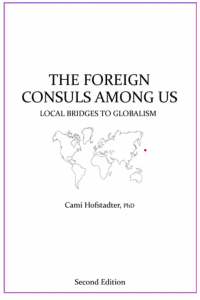New digital handbook, Foreign Consuls as Local Bridges to Globalism Should honorary consuls share an official platform with diplomats to denounce the
Should honorary consuls share an official platform with diplomats to denounce the Russian invasion of Ukraine?
MIAMI, FLORIDA, USA, March 17, 2022 /EINPresswire.com/ — The United States is host to about three-thousand foreign consuls representing not only Russia and Ukraine of course, but a plethora of other nations, big and small and not all members of the United Nations with its peace-building mission. So, when an honorary consul issues a political opinion on the conflict between Russia and Ukraine it begs the question about the role of foreign consuls, not just honorary consuls, performing their functions in all fifty US states.
“With the knowledge that’s easily and quickly available in this easy-to-understand digital book, anyone can learn what a foreign consul’s legitimate role is,” says Cami Hofstadter, author of The Foreign Consuls Among Us: Local Bridges to Globalism. “As regular citizens, we don’t have to wait for a public statement by Ukrainian consuls on the Russian invasion of their country to condemn this act of aggression ourselves.”
A European and US-educated lawyer with a PhD in Educational Leadership, Hofstadter has certificates from the University of Geneva (International Organizations) and the Hague Academy of International Law (Diplomatic Law). Throughout her career in international education, she maintained her lifelong passion for writing in different genres, particularly with a focus on human interest stories. She’s been a peer reviewer for a university press of a book on Jewish identity that combines humor with scholarly research, while she’s also the winner of a humor contest herself.
She believes that serious topics like the nature of all foreign consuls can and should be made accessible to the wider population than just inside academe, and designed her book The Foreign Consuls Among Us: Local Bridges to Globalism to hit that target.
“I’m dedicated to making an academic topic highly readable for civic, business, and educational leaders without a legal background,” says Hofstadter. “This began with the research I did as a young law student at the University of Helsinki (Finland) and continued throughout my personal experience as an honorary consul in S. Florida. My decades-long interest in the nature of the consular institution then resulted in a series of prior publications (including an exploration of the obscure history of what’s called a consular corps), which has now culminated in the digital format (Kindle and Nook) of my easy-to-read manual.”
Kirkus Reviews said this about the book: “[author] writes with a great deal of polish and good humor in a style that is informal yet authoritative…. Well-written and lively, offering an engaging way to learn about the sometimes-perplexing world of foreign consulates.”
Hofstadter also points out that membership organizations often invite consuls to address current topics relating to the nations these foreign officials represent. Among her examples are local chapters of the Council of International Visitors, the U.N. Association, People-to-People, Rotary International, and Sister Cities.
“To gain meanings from these presentations, we must understand the difference between honorary and career consuls and the relationship to their embassies. How else will we know if Russian or Ukrainian consuls are sharing their personal opinions or merely spouting the official view of the government they represent?” concludes Hofstadter.
For further information, contact: Cami Hofstadter at cami@chofstadter.com
https://www.seagreenpress.com
Cami Hofstadter
Seagreen Press
+1 305-891-3662
cami@chofstadter.com
![]()
